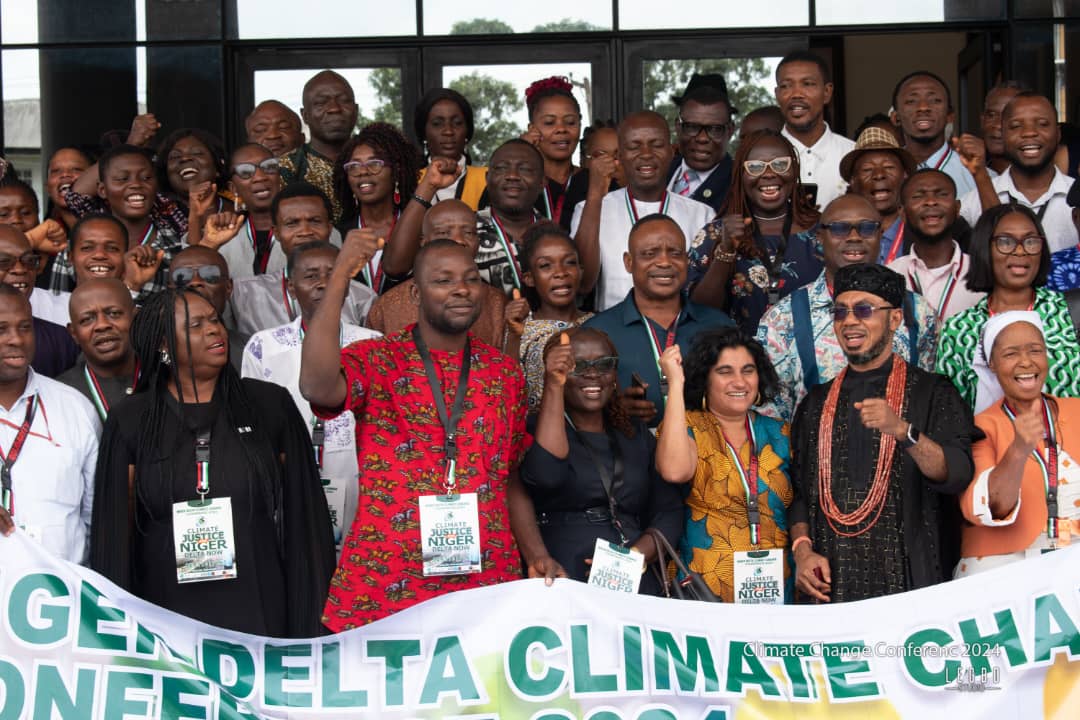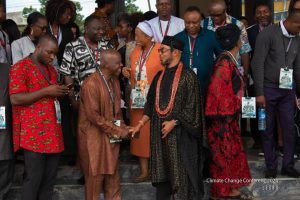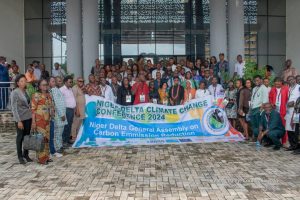… Lekeh Foundation installs Solar in 50 Households across Local Community
By Tina Amanda
The push for a just energy transition in Nigeria has gained momentum, with a call for the country’s energy framework to prioritize renewable energy investments in the Niger Delta, ensuring no community is left behind.
This was the central theme at the Niger Delta Climate Change Conference 2024, organized by the Lekeh Development Foundation and partners in Port Harcourt. The conference, themed “Acting Together for Climate Resilience: A Recovery Plan for the Niger Delta,” brought together local communities, grassroots leaders, civil society organizations, government officials, and international participants.
During the event, Lekeh Development Foundation’s Executive Director, Friday Nbani, emphasized the need for Nigeria to phase out fossil fuels and transition to cleaner energy due to the negative impacts on local communities.
Nbani highlighted the foundation’s efforts in solar energy installations, including streetlights in markets and health centers, and solar systems in 50 households across local communities.
“We need to move away from fossil fuels, Although Nigeria relies heavily on fossil fuel revenue, the environmental and health costs on local communities are dire. Transitioning to renewable energy is not only environmentally friendly but also crucial for the well-being of our people.
“Through the advocacy, campaign, and awareness raising we were able to galvanize funding and install solar into fifty (50) households, install street light solar in local communities for community markets, especially for the health centers.
“We also build solidarity awareness on the negative impact within the region. John Manson says; “You cannot get the right answer without knowing the question” We need to know what is wrong and bring a solution to what is wrong, that is why I like what HYPREP is doing about the remediation process, it just that sometimes people say they are slow, of course they are, for them to come up and put the remediation process is just a starting point.
“It’s because of the pains and hunger challenges in the land that made us to say let’s reason together. This issue of climate injustice, climate disaster, what can we do what is the solution, what can we bring together, who can help, what can we contribute what kind of commitment can we demand from the government and other agencies?
“Shell and other multinational Industries that pollute our environment do not care, so if they do not care we have to care as a common citizen of that particular community and country. The conference is just like a strategy of bringing ideas together to demand our environment right.”
The conference also featured presentations from key speakers like Professor Olufemi Adesope of the Department of Agric Extension and Development Studies University of Port Harcourt, who stressed the importance of collaboration in managing climate-related issues. He advocated for waste management innovations, such as Lasede fly technology, which can reduce the carbon footprint by converting waste into fertilizer.
“It does not cost much to do it’s an insect that does not carry any disease but it has a lot to do with managing the environment. It has a beautiful system that can convert waste before it begins to smell, it collects it and changes it to fertilize that we can also use in that way it reduces the carbon footprint bedeviling the environment.
“It’s a collective effort; individual, community members, government, and non-governmental organizations are coming together. Individuals should speak out and community members should be carried along in the process so that they know what they can do to manage their own environment.”
Nnimmo Bassey, Executive Director of the Health of Mother Earth Foundation (HOMEF), called for urgent action to halt gas flaring and a shift away from fossil fuels. He stressed the need for environmental and health audits across the Niger Delta, similar to the Ogoni cleanup efforts.
“But in terms of adapting people have to survive and the number one thing is to carry out an environmental and health audit of the entire region so that we know what is the problem and action to be taking just like the Ogoni clean up came after the audit. Bayelsa State government has carried out an audit of Bayelsa State by the State Oil and Environment Commission that issued a report in August last year, we need to do that.
“Restoring the environment is not enough, we must also restore livelihoods and ensure that the people of the Niger Delta are resilient to global climate impacts.”
Kathy Malvey, representing the Union of Concerned Scientists in the U.S., pointed out that the Niger Delta’s challenges mirror those faced by marginalized communities worldwide.
She called for global accountability and financial support to aid the transition to cleaner energy.
“Globally we need to take actions to advance the decision to finance a transition to cleaner renewable energy and that’s commitment especially global holding the organizations accountable. Act together to phase off fossil fuel in a way that is fair and just, bring safety to the community and next generation.”
Ibironke Olubamise, the National Coordinator for the United Nations Development Program Global Environment Facility (UNDP-GEF) Small Grants Program in Nigeria, revealed that the initiative has successfully supported more than 200 environmental projects across 200 communities in 30 states. The program, which is implemented by the UNDP, works closely with over 100 civil society organizations (CSOs).
She urged more CSO”s to seize the opportunity to apply for project funding.
“In Rivers State alone, the program has collaborated with six CSOs, with one receiving support twice. We continue to emphasize community involvement in environmental management as improving livelihoods through environmental initiatives is a key focus.
The conference concluded with a communique demanding corporate accountability from oil companies for environmental restoration, health audits, and compensation to communities before any divestment. It also called for a just energy transition, community-based climate resilience efforts, and greater inclusion of women and youth in climate action.
Key recommendations included prioritizing environmental cleanups, enforcing corporate accountability, and accelerating the transition to renewable energy in the Niger Delta. International development partners were urged to provide financial and technical support for climate resilience and adaptation projects.






